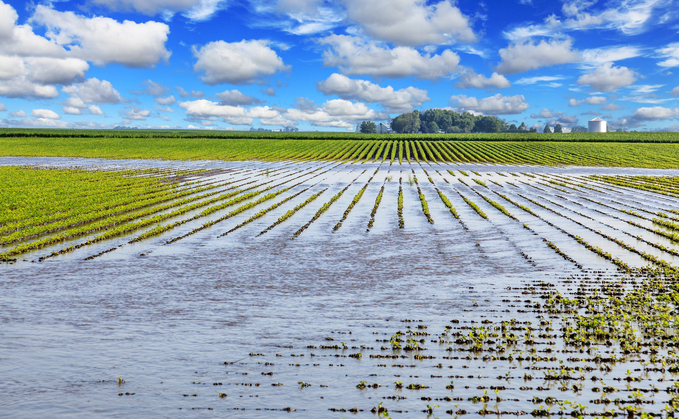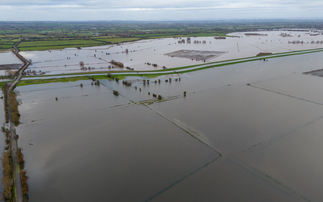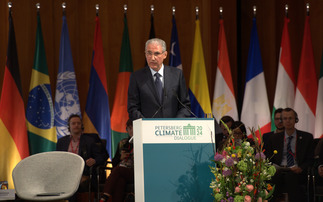Credit: iStock
ECIU claims poor yields caused by extreme winter weather are set to cut UK self-sufficiency across all farming sectors
The UK's ability to feed itself is forecast to fall by almost 10 per cent, according to a new analysis from the Energy and Climate Intelligence Unit (ECIU) that assesses the impact of one of the wettest winters on record on agricultural production.
Recent reports show the 18 months to March 2024 were England's wettest since records began in 1836, while UK Met Office data found the period from the start of December 2023 to the end of February 2024 was among the wettest on record, with the 445.8mm of rain falling within the season 29 per cent higher than the long-term average.
The rainfall has left soils waterlogged and resulted in many fields being flooded throughout much of the winter, prompting warnings from farmers they are now facing one of the worst harvests in decades.
The new analysis from the ECIU estimates the resulting reduced production of key arable crops will reduce self-sufficiency across all farming sectors by eight percentage points by volume - declining from an average of 86 per cent between 2018 and 2022 to 78 per cent this year.
The think tank predicts the UK could become dependent on foreign imports for around a third of its wheat, with wheat self-sufficiency estimated to decline from 92 per cent to 68 per cent.
Climate scientists warn that milder, wetter winters like the one the UK has just experienced are projected to become increasingly common as the world warms, fuelling fears climate impacts could undermine food security.
"In 2021, the government warned that climate change was the biggest medium to long term threat to our food security," said Tom Lancaster, land analyst at ECIU. "This analysis suggests that it is the biggest risk now, not at some far-off point in the future. Ultimately, we need to support our farmers to better cope with climate extremes, and Defra's new green farming schemes will be crucial in this, building the resilience of our soils to floods and droughts, as well as planting trees and hedgerows that will trap carbon and slow flood waters."
He also warned the UK needed to consider how to bolster food security across its global supply chains. "The UK depends on foreign imports for the foods we cannot grow here, so if we are to try to sustain the supply we have at the minute, we simply can't grow everything we have now on British soil, so will also need to think about supporting farmers in other, often poorer and more climate vulnerable, countries," he said.
ECIU estimates that, compared to the average production between 2018 and 2022, and assuming an overall level of consumer demand equivalent to the average over the same period, the reduction in wheat self-sufficiency could see imports rise from 1.9 million tonnes to 4.8 million tonnes.
UK flour millers have warned the higher-grade milling wheat harvest could be down by as much as 40 per cent, fuelling concerns about the impact on the price of bread and other baked goods.
And while production of oats and barley is predicted to remain largely stable due to higher anticipated areas of spring planting, self-sufficiency in oilseed rape is expected to collapse to a historic low of 40 per cent if demand remains in line with that seen between 2018 and 2022, down from 75 per cent.
The analysis comes as the Prime Minister prepares to host farmers and food industry representatives at Downing Street for his 'Farm to Fork Summit'.
"With its recent U-turns on climate policy, it's possible the government will try to downplay the threat climate change poses to our food security at this summit, but farmers consistently report the changing climate is one of, if not the, greatest threat to their harvests," Lancaster said. "The only viable long-term plan for farming is getting to net zero emissions when we are no longer making the problem ever worse."
A Defra spokesperson, however, stressed that food production, food security and backing UK farmers are key priorities for this government. "We are acutely aware of the impact the extreme weather can have on the farming community," they said.
"We have protected over 900,000 acres of agricultural land from the impacts of flooding since 2015 and opened the Farming Recovery Fund, which provides grants of up to £25,000 to eligible farmers to return their land to the condition it was in before the exceptional flooding caused by Storm Henk."
Today's analysis comes after ECIU published research claiming this year's harvest could be down by as much as a fifth compared 2023 due to the wet winter, following two years in which climate change impacts and higher gas prices added £361 to the average household food bill.
Keep up to date with all the latest green business news by signing up to the free Daily and Weekly BusinessGreen Newsletters.










